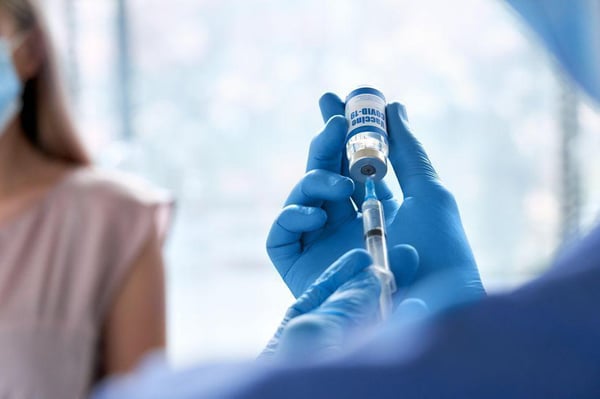Pfizer Says Vaccine Booster Should Protect Against Omicron Variant

WEDNESDAY, Dec. 8, 2021 (HealthDay News) -- Pfizer/BioNTech said Wednesday that while two doses of their coronavirus vaccine may not offer good protection against the Omicron variant, adding a booster shot does the trick.
According to a statement from the companies, blood tests from people who had only two doses of the vaccine showed a 25-fold reduction in antibody levels generated against the Omicron variant, compared to earlier SARS-CoV-2 variants.
But adding in a booster shot saw antibody responses return to robust numbers. In fact, blood samples obtained from people a month after they'd gotten their booster shots showed a level of antibodies against Omicron that were equal to those seen against other variants after two doses.
“Although two doses of the vaccine may still offer protection against severe disease caused by the Omicron strain, it’s clear from these preliminary data that protection is improved with a third dose of our vaccine,” Pfizer Chairman and CEO Albert Bourla said in the statement. “Ensuring as many people as possible are fully vaccinated with the first two dose series and a booster remains the best course of action to prevent the spread of COVID-19.”
There was also more good news: Mutations found on Omicron don't seem to affect the response of T-cells, another key player in the body's immune response against infection, Pfizer said.
“Our preliminary, first data set indicate that a third dose could still offer a sufficient level of protection from disease of any severity caused by the Omicron variant,” BioNTech CEO Dr. Ugur Sahin added in the statement.
On Tuesday, preliminary data out of South Africa also showed that the Omicron variant appeared to dampen the immunity provided by the two-dose Pfizer vaccine.
The South African findings came from lab tests using blood and lung cells from 12 people who had been fully vaccinated with the Pfizer vaccine.
People who were previously infected with coronavirus and then got the vaccine appeared to be well-protected, and boosters are likely to guard against severe disease, the South African researchers reported.
"There is a very large drop in neutralization of Omicron by BNT162b2 [Pfizer/BioNTech] immunity relative to ancestral virus," study leader Alex Sigal, from the Africa Health Institute in Durban, South Africa, announced on Twitter. "Omicron escape from BNT162b2 neutralization is incomplete. Previous infection + vaccination still neutralizes."
But things aren't as bad as they might seem, he added.
"I thought this news was very positive. I expected worse," Sigal told CNN. "This is not a variant that has completely escaped," immunity offered by the vaccine, he said. "It certainly escapes. It is certainly bad. But it looks to me like there are ways of dealing with it."
In the small study, Sigal's team found a 41-fold decrease in the levels of neutralizing antibodies against Omicron in some of the samples, when compared to those generated against one of the earlier strains of the virus. However, it's not clear how that might translate into real-life protection and that number will almost certainly change as more samples are tested, Sigal noted, because there's a lot of variation from person to person when it comes to antibodies generated by vaccination.
The South African team did not test the Omicron variant against the blood of people who had received Pfizer vaccine boosters, but Sigal expected boosters to add a layer of protection.
"My impression is if you get a booster you are protected, especially against severe disease," he said. "It took a hit -- a bigger hit than we have seen before -- but it didn't take it down to levels that are insubstantial."
The data released Wednesday by Pfizer appeared to support that view.
Kristian Andersen, an infectious disease researcher at the Scripps Research Institute in La Jolla, Calif., agreed that booster shots were likely to help fend off the new variant.
"I expect boosters to restore better levels of protection," he told the Times. "And, importantly, early clinical data from South Africa suggest that immunity — whether from vaccines or prior infections — is still effective in preventing the more severe forms of COVID-19."
Another hopeful sign the researchers discovered? The Omicron variant continues to attacks human cells through the ACE2 receptor.
"Imagine if this virus had found a different receptor to bind to?" Sigal asked. "Then all of our vaccines would have been trash."
The South African study has been submitted to the online preprint site medRxiv, and has not yet been peer-reviewed. Sigal's team plans to test more samples against different vaccines, including the Johnson & Johnson shot, which was deployed widely in South Africa, CNN reported.
Pfizer and Moderna have also said that they are testing their vaccines against Omicron, and that they would be able to produce vaccines specifically tailored to the variant in roughly three months.
More information
Visit the U.S. Centers for Disease Control and Prevention for more on COVID variants.
Related Posts
Early U.S. Data Show Jynneos Vaccine Protects Against Monkeypox
THURSDAY, Sept. 29, 2022 (HealthDay News) -- The Jynneos vaccine, originally...
Pandemic Showed Teachers’ Key Role in Spotting Child Abuse
THURSDAY, Aug. 11, 2022 (HealthDay News) -- Teachers play a critical role in the...
‘Baby Talk’ Could Help Spot Infants With Autism
WEDNESDAY, Jan. 5, 2022 (HealthDay News) -- That sing-song speech parents use...
Un nuevo implante cardiaco monitoriza, trata… y luego se disuelve
VIERNES, 7 de julio de 2023 (HealthDay News) -- Un implante experimental que...
